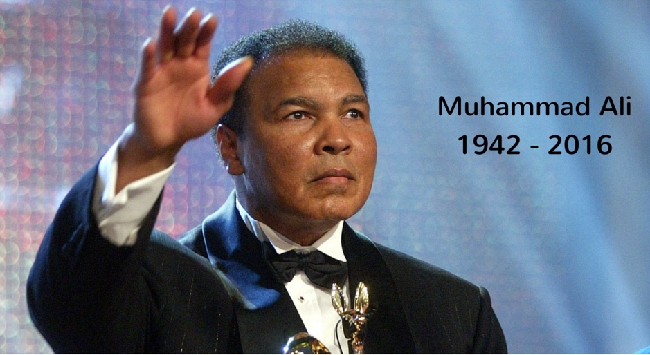I am America. I am the part you won’t recognize. But get used to me – black, confident, cocky; my name, not yours; my religion, not yours; my goals, my own. Get used to me.”
Muhammad Ali loved the sound of his own voice, and so did everyone else. His words were predictably impossible to top on Saturday, as America mourned the loss of a colossus not only in the boxing ring but the arenas of politics, religion and popular culture.
Advertisement
Born in the south before Rosa Parks refused to give up her seat for a white bus passenger, he died at the age of 74, having seen the first African American elected to the White House. Barack Obama led tributes to the incandescent athlete, activist, humanitarian, poet and showman with a statement that caught the mood of many.
It said: “Muhammad Ali was the Greatest. Period. If you just asked him, he’d tell you. He’d tell you he was the double greatest; that he’d ‘handcuffed lightning, thrown thunder into jail’. But what made the Champ the greatest – what truly separated him from everyone else – is that everyone else would tell you pretty much the same thing.”
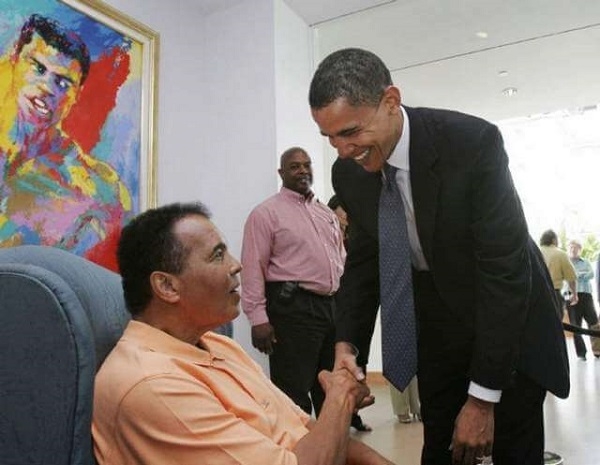
The president continued: “Like everyone else on the planet, Michelle and I mourn his passing. But we’re also grateful to God for how fortunate we are to have known him, if just for a while; for how fortunate we all are that the Greatest chose to grace our time.”
Muhammad Ali shook up the world. And the world is better for it. We are all better for it.
Advertisement
Obama said he kept a pair of Ali’s gloves on display in his private study, under a celebrated photo of him, aged 23, “roaring like a lion” over a fallen Sonny Liston. His name was “as familiar to the downtrodden in the slums of south-east Asia and the villages of Africa as it was to cheering crowds in Madison Square Garden”, the president said.
“Muhammad Ali shook up the world. And the world is better for it. We are all better for it.”
The three-time world heavyweight champion died late on Friday evening, a day after he was admitted to a Phoenix-area hospital with a respiratory ailment. His family were gathered around him. Ali had long battled Parkinson’s disease, which impaired his speech and made the irrepressible athlete – known for saying he could float like a butterfly and sting like a bee – something of a prisoner in his own body.
He was born Cassius Clay in Louisville, Kentucky on 17 January 1942. He began boxing aged 12, after his new bicycle was stolen and he vowed to a policeman that he would “whup” the person who took it. For a while, the “Louisville Lip”, blessed with outsized charisma and wit, was possibly the most famous person on the planet.
Advertisement
“I am the greatest,” he declared, and he repeatedly proved it.
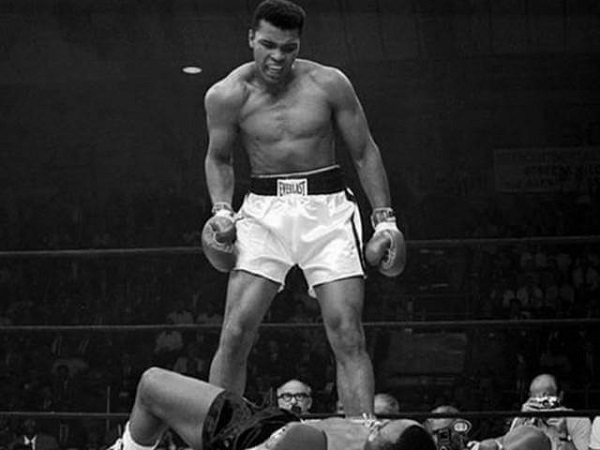
In an incomparable career, Ali beat the seemingly invincible Liston, fought thrilling fights with Joe Frazier and stopped George Foreman in the “Rumble in the Jungle” in Zaire, now the Democratic Republic of the Congo. He promoted that fight by saying: “You think the world was shocked when Nixon resigned. Wait till I whup George Foreman’s behind.”
On Saturday, Foreman told the BBC: “You know what, I found Muhammad Ali to be one of the greatest human beings I’ve ever met in my life. I got beat up in the jungle. We never had any arguments until we met in the ring that night. I hit him with everything I had, and all he would say is, ‘That all you got, George?’
“What a night. Muhammed Ali, Joe Frazier and myself were one guy – we lived through each other. A big piece of me died when he passed away, and I call it the greatest piece.”
Outside the ring, Ali was a giant of 20th-century American and African American history, a pivotal figure in the tumult of the 1960s struggle for civil rights and the backlash against the Vietnam war.
Advertisement
After he upset Liston to win the heavyweight title in 1964, Ali announced that he was a member of the Nation of Islam, a wildly unpopular thing to do at the time, and was rejecting his “slave name”, Cassius Clay, in favour of Muhammad Ali.
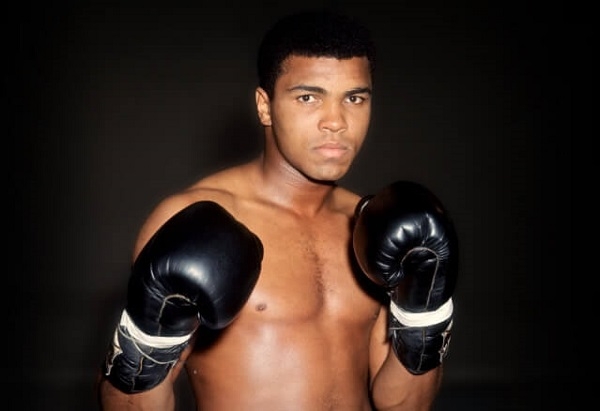
Even more divisive among both black and white Americans was Ali’s stand against the Vietnam war.
“I ain’t got no quarrel with them Viet Cong,” he said.
He was convicted of draft evasion, stripped of his title, banned from boxing for more than three years and reviled by many – a hatred that was hard to remember during Saturday’s eulogies. The US Supreme Court later overturned his conviction and granted him conscientious objector status.
Ali traveled the world for Islam and other causes. He met world leaders including Nelson Mandela, an amateur boxer in his youth who was a great admirer. Ali once told the Philippine president Ferdinand Marcos: “I saw your wife. You’re not as dumb as you look.”
Bob Arum, who promoted 26 Ali fights, told the Associated Press: “He’s the most transforming figure of my time, certainly. He did more to change race relations and the views of people than even Martin Luther King. It was a privilege and an honor for me to know him and associate with him.”
Ali was given a diagnosis of Parkinson’s in 1984 at the age of 42, three years after retiring from the ring. Doctors have debated whether the estimated 29,000 punches he took to the head in 61 fights and countless sparring sessions played a part. There was a unique tragedy in seeing the most beautiful, graceful and articulate of sportsmen barely able to walk, slowly robbed of his speech and facial expressions. In Atlanta in 1996, with trembling hands, he lit the Olympic torch.
On Saturday, politicians, historians and sportspeople heaped praise on Ali’s legacy and flair. Bill Clinton: “From the day he claimed the Olympic gold medal in 1960, boxing fans across the world knew they were seeing a blend of beauty and grace, speed and strength that may never be matched again.
“We watched him grow from the brash self-confidence of youth and success into a manhood full of religious and political convictions that led him to make tough choices and live with the consequences.
“Along the way we saw him courageous in the ring, inspiring to the young, compassionate to those in need, and strong and good-humored in bearing the burden of his own health challenges.”
The Rev Jesse Jackson, founder and president of the Rainbow Push Coalition and a longtime friend, said: “He was a champion in the ring, but, more than that, a hero beyond the ring. When champions win, people carry them off the field on their shoulders. When heroes win, people ride on their shoulders. We rode on Muhammad Ali’s shoulders.”
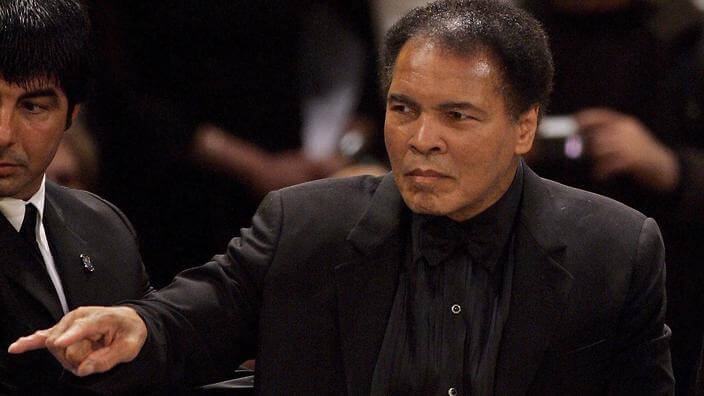
The presumptive Republican presidential nominee, Donald Trump, known for his controversial comments about Muslims, tweeted at 12.29am: “Muhammad Ali is dead at 74! A truly great champion and a wonderful guy. He will be missed by all!”
Ali’s death also resonated around the world. The British Prime Minister, David Cameron, wrote on Twitter: “Muhammad Ali was not just a champion in the ring – he was a champion of civil rights, and a role model for so many people.”
Ali met the Beatles in 1964 when the group flew to Miami to appear on The Ed Sullivan Show. On Saturday, Sir Paul McCartney said: “I loved that man.
“Besides being the greatest boxer, he was a beautiful, gentle man with a great sense of humour who would often pull a pack of cards out of his pocket, no matter how posh the occasion, and do a card trick for you. The world has lost a truly great man.
”Brazilian soccer great Pelé said: “The sporting universe has just suffered a big loss. Muhammed Ali was my friend, my idol, my hero. We spent many moments together and always kept a good connection throughout the years. The sadness is overwhelming. I wish him peace with God. And I send love and strength to his family.”
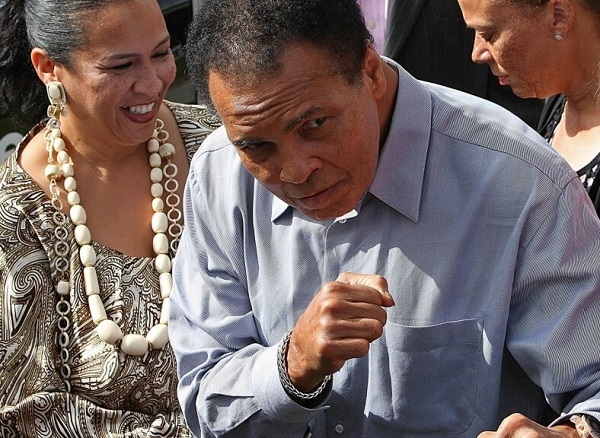
Ali is survived by his fourth wife – the former Lonnie Williams, who knew him when she was a child in Louisville – and his nine children. His funeral will take place in his hometown of Louisville, where flags were lowered to half-mast on Saturday morning, and flowers laid at the Muhammad Ali Center.
Asked once about his preferred legacy, Ali said: “I would like to be remembered as a man who won the heavyweight title three times, who was humorous and who treated everyone right.
“As a man who never looked down on those who looked up to him … who stood up for his beliefs … who tried to unite all humankind through faith and love.
“And if all that’s too much, then I guess I’d settle for being remembered only as a great boxer who became a leader and a champion of his people. And I wouldn’t even mind if folks forgot how pretty I was.”


